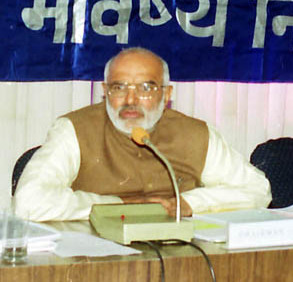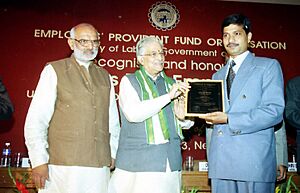Sahib Singh Verma facts for kids
Quick facts for kids
Sahib Singh Verma
|
|
|---|---|
 |
|
| 4th Chief Minister of Delhi | |
| In office 27 February 1996 – 12 October 1998 |
|
| Preceded by | Madan Lal Khurana |
| Succeeded by | Sushma Swaraj |
| Personal details | |
| Born | 15 March 1943 Delhi, British India |
| Died | 30 June 2007 (aged 64) Jonaicha Khurd, Rajasthan, India |
| Political party | Bharatiya Janata Party |
| Spouse |
Sahib Kaur
(m. 1954) |
| Children | 5 (including Parvesh Verma, Siddharth Sahib Singh) |
Sahib Singh Verma (born March 15, 1943 – died June 30, 2007) was an important Indian politician. He was a senior leader in the Bharatiya Janata Party, which is a major political group in India. Mr. Verma served as the Chief Minister of Delhi from 1996 to 1998. Later, he was also a member of the Indian Parliament from 1999 to 2004. During this time, he worked as the Union Labour Minister of India.
Contents
Early Life and Education
Sahib Singh Verma was born on March 15, 1943. His birthplace was Mundka village in Delhi. His father, Mir Singh, was a farmer. His mother's name was Bharpai Devi. They belonged to a Jat family. From a young age, he was inspired by the Arya Samaj, a social and religious movement.
Mr. Verma was very educated. He earned a PhD degree in Library Science. He started his career as a librarian at Bhagat Singh College in Delhi. He also held two master's degrees. One was a M.A. and the other was in Library Science. He got these degrees from Aligarh Muslim University.
In 1954, when he was just 11 years old, he married Sahib Kaur. They had five children together. They had two sons and three daughters. One of his sons, Parvesh Verma, is also a politician. He is currently a Member of Parliament from West Delhi.
Political Journey
Sahib Singh Verma was very active in public life. He was involved with the Rashtriya Swayamsevak Sangh, a well-known organization. He also served as the president of the World Jat Aryan Foundation.
His political career began in 1977. He was elected to the Municipal Corporation of Delhi. This is the local government body for Delhi. He first won as a candidate for the Janata Party. Later, he was re-elected with the BJP. In 1993, he became the Education and Development Minister in the Delhi government.
Becoming Chief Minister
In 1996, Sahib Singh Verma became the Chief Minister of Delhi. This happened after the previous Chief Minister, Madan Lal Khurana, stepped down. Mr. Verma served as Chief Minister for about two and a half years. He faced some challenges during his time. Eventually, he was replaced by Sushma Swaraj.
Role in Parliament
After his time as Chief Minister, he ran for the Lok Sabha in the 1999 elections. The Lok Sabha is one of the two houses of the Indian Parliament. He won from the Outer Delhi area by a large number of votes.
In 2002, he became the Minister of Labour in the government led by Atal Bihari Vajpayee. He was known for standing up for what he believed was right. He worked to protect the interests of workers.
He ran for re-election in 2004 but was not successful.
Passing Away
Sahib Singh Verma passed away on June 30, 2007. He died in a road accident in Rajasthan.
See also
- Verma cabinet
 | Georgia Louise Harris Brown |
 | Julian Abele |
 | Norma Merrick Sklarek |
 | William Sidney Pittman |


